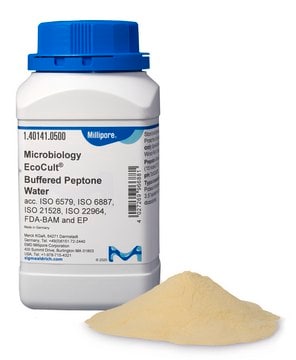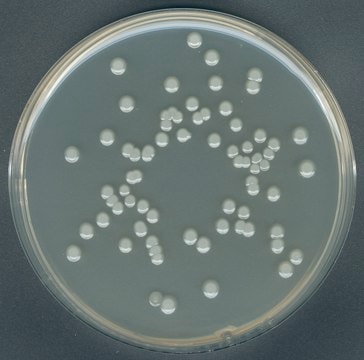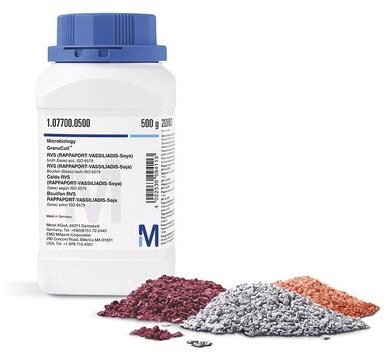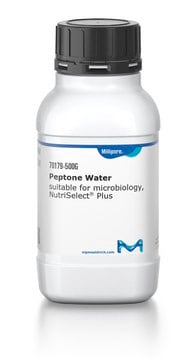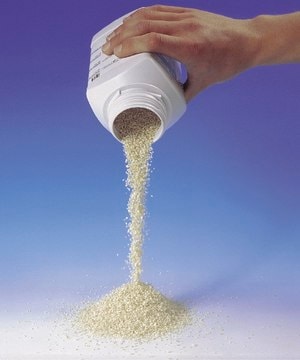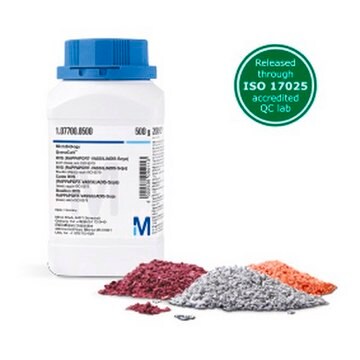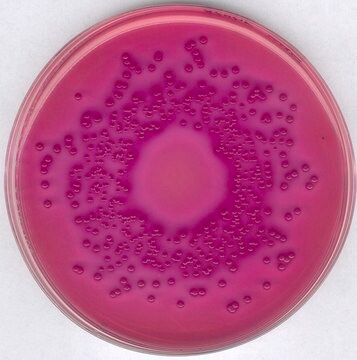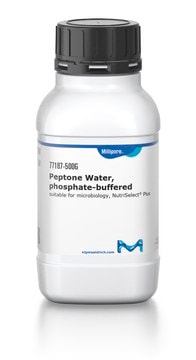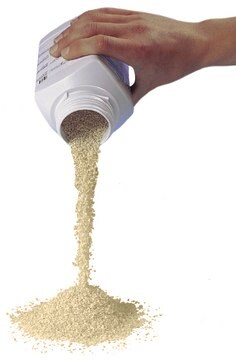1.07228
Buffered Peptone Water
GranuCult® prime, ISO 19250, ISO 6579-1, ISO 21528-1, ISO 22964, FDA-BAM, EP, granular, pkg of 0.5-25 kg
Synonim(y):
BPW, Buffered Peptone Solution, GranuCult® BPW, Peptone Water (buffered), Peptone Water, buffered, Peptone Water, phosphate-buffered, Tryptone Phosphate Water
About This Item
Polecane produkty
agency
APHA
EP
FDA-BAM
ISO 19250
ISO 21528-1
ISO 22964
ISO 6579-1
ISO 6887
Poziom jakości
sterylność
non-sterile
Postać
granular
opakowanie
pkg of 0.5-25 kg
producent / nazwa handlowa
GranuCult® prime
metody
microbiological culture: suitable
pH
7.2 (37 °C, 25 g/L in H2O, after autoclaving)
rozpuszczalność
25.5 g/L
gęstość nasypowa
800 kg/m3
Zastosowanie
food and beverages
microbiology
pathogen testing
temp. przechowywania
15-25°C
przydatność
Cronobacter spp.
Salmonella spp.
enterobacteriaceae
nonselective for bacteria (preliminary enrichment)
Szukasz podobnych produktów? Odwiedź Przewodnik dotyczący porównywania produktów
Opis ogólny
GranuCult® is our new brand name for our existing granulated dehydrated culture media which apply to new EN ISO 11133:2014 and various other ISO standards and FDA-BAM / USDA-FSIS methods for testing of food and water samples. All these media are currently being updated to be fully compliant to the latest version of these standards and regulations with respect to composition and quality control and will be available shortly.
Zastosowanie
Powiązanie
Przechowywanie i stabilność
- Store at +15 °C to +25 °C, dry and tightly closed.
- Do not use clumped or discolored medium.
- Protect from UV light (including sunlight).
- For in vitro use only.
- According to EN ISO/FDIS 6579-1, the self-prepared medium can be stored in closed containers at +2 °C to +8 °C in the dark and protected against evaporation for up to six months.
Komentarz do analizy
Appearance (colour): yellowish
pH-value (25 °C): 6.8 - 7.2
Growth promotion test in accordance with the current version of DIN EN ISO 11133 and the harmonised method of EP, USP and JP.
Inoculum on reference medium (Escherichia coli ATCC 25922 (WDCM 00013)): ≤ 100
Inoculum on reference medium (Escherichia coli ATCC 8739 (WDCM 00012)): ≤ 100
Inoculum on reference medium (Salmonella typhimurium ATCC 14028 (WDCM 00031)): ≤ 100
Inoculum on reference medium (Salmonella enteritidis ATCC 13076 (WDCM 00030)): ≤ 100
Inoculum on reference medium (Salmonella Abony NCTC 6017): ≤ 100
Growth (Escherichia coli ATCC 25922 (WDCM 00013)): good to very good
Growth (Escherichia coli ATCC 8739 (WDCM 00012)): good to very good
Growth (Salmonella typhimurium ATCC 14028 (WDCM 00031)): good to very good
Growth (Salmonella enteritidis ATCC 13076 (WDCM 00030)): good to very good
Growth (Salmonella Abony NCTC 6017): good to very good
Incubation:
18 ± 2 hours at 37 ± 1 °C
S.abony 18 - 24 hours at 30 - 35 °C
Inne uwagi
Przypis
The designations basic, plus, or prime are added to indicate the quality control level, from basic quality control to standard QC plus to prime for full regulatory compliance.
Informacje prawne
Kod klasy składowania
11 - Combustible Solids
Klasa zagrożenia wodnego (WGK)
WGK 1
Certyfikaty analizy (CoA)
Poszukaj Certyfikaty analizy (CoA), wpisując numer partii/serii produktów. Numery serii i partii można znaleźć na etykiecie produktu po słowach „seria” lub „partia”.
Masz już ten produkt?
Dokumenty związane z niedawno zakupionymi produktami zostały zamieszczone w Bibliotece dokumentów.
Klienci oglądali również te produkty
Produkty
Shigella spp. are predominantly connected to humans and are rarely isolated from other animals, with the exception of primates.
Salmonella pass through the entire food chain from animal feed, primary production, and into households or food-service establishments.
Technical article on Cultivation of Shigella
Protokoły
Revised EN ISO 21528:2017 for detection and enumeration of Enterobacteriaceae in the food chain.
The International Organization for Standardization (ISO) has published the new EN ISO 22964:2017 standard, which specifies a horizontal method for the detection of Cronobacter spp. in food, animal feed and environmental samples.
Nowa norma EN ISO 22964:2017 określa horyzontalną metodę wykrywania bakterii Cronobacter spp. w żywności, paszy dla zwierząt i próbkach środowiskowych.
Międzynarodowa Organizacja Normalizacyjna (ISO) opublikowała w 2017 r. poprawione normy EN ISO 21528-1 i EN ISO 21528-2.
Powiązane treści
Food microbiology testing is a key part of the food safety and quality management. Learn more about the wide range of tests covering pathogens and spoilage organisms.
Badania mikrobiologiczne żywności są kluczowym elementem zarządzania bezpieczeństwem i jakością żywności. Dowiedz się więcej o szerokiej gamie testów obejmujących patogeny i organizmy powodujące psucie się żywności.
Badania mikrobiologiczne żywności są kluczowym elementem zarządzania bezpieczeństwem i jakością żywności. Dowiedz się więcej o szerokiej gamie testów obejmujących patogeny i organizmy powodujące psucie się żywności.
Nasz zespół naukowców ma doświadczenie we wszystkich obszarach badań, w tym w naukach przyrodniczych, materiałoznawstwie, syntezie chemicznej, chromatografii, analityce i wielu innych dziedzinach.
Skontaktuj się z zespołem ds. pomocy technicznej